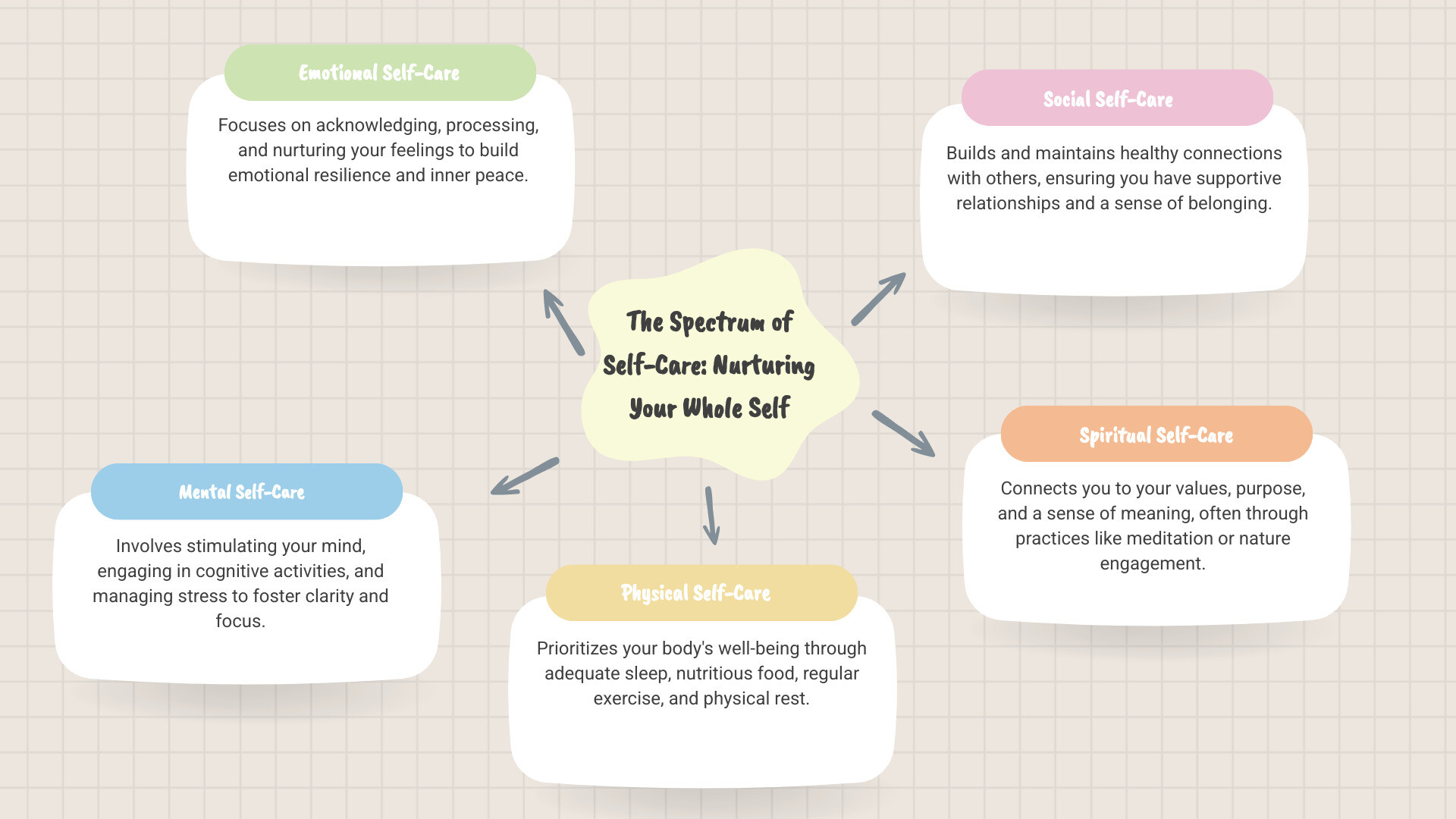Why Emotional Self-Care is Key to Your Balance
Emotional self care is a vital practice for your inner peace. It helps you manage feelings and respond to life’s ups and downs. It’s often misunderstood, seen as just a luxury like a spa day. But it’s much more than that. It’s about truly looking after your feelings and mind.
Here’s a quick look at what emotional self-care means:
- Understanding your feelings: Knowing what you feel and why.
- Processing emotions: Dealing with feelings in healthy ways, instead of ignoring them.
- Meeting emotional needs: Giving yourself what you need to feel calm and balanced.
- Building resilience: Becoming stronger in the face of stress and challenges.
Many of us feel overwhelmed, stressed, or on the edge of burnout. This isn’t how life has to be. Taking care of your emotional well-being is a core step toward a more balanced life. It’s a purposeful act that helps you nourish your mental health and keep your emotions stable.
Think of it as a way to keep your inner world steady, no matter what happens outside.

Learn more about emotional self care:
Understanding Emotional Self-Care and Its Importance
In our busy world, emotional self care often gets pushed aside. But true well-being starts from within by nurturing your emotional health. It’s a cornerstone for your overall health, helping you manage daily stress and bounce back from life’s inevitable curveballs. Experts agree: making time for your emotions is a non-negotiable part of living a full, vibrant life.
Many of us feel drained by work and life’s demands. That constant juggling can leave us feeling tired and “frazzled.” A 2020 survey by the American Psychological Association (APA) found that three out of five employees felt negative effects from work stress, like losing interest or energy.
Fortunately, awareness is growing. When you prioritize your emotional needs, you build resilience, prevent burnout, and set yourself up for a longer, healthier, and happier life.
Ready to dive deeper into nurturing your emotional well-being? Check out resources from the CDC: Emotional Well-Being and find Why Is Mental Health Important?.
What is emotional self-care?
At its core, emotional self care is the active choice to nurture, understand, and heal your feelings. It means intentionally checking in with yourself, acknowledging how you’re feeling, and then giving your emotions what they need. It’s like being a kind friend to your own inner world.
While pampering like a soothing bubble bath can feel good, emotional self care goes much deeper. It’s not just about indulgence; it’s about practices that genuinely feed your soul. These actions help you process tough emotions, let go of negativity, and stay mentally strong. It’s about honoring your feelings and moving forward in a way that feels right for you.
It’s a cornerstone for your inner peace and balance. When you practice emotional self care, you’re actively building a life you truly love, from the inside out. Want to learn more? Our guide on Emotional Health has even more insights.
How it differs from other self-care
Self-care has many facets, but emotional self care has a unique role. While every type of self-care boosts your overall well-being, it’s helpful to see how they fit together.
Other types include physical self-care (getting 7-9 hours of sleep, eating nourishing foods, moving your body), mental self-care (learning something new, reading), social self-care (nurturing relationships, setting boundaries), and spiritual self-care (finding meaning through meditation or connecting with nature).
These areas are wonderfully interconnected. For example, poor sleep (physical) can disrupt your mood (emotional). And quality time with friends (social) can give your emotional state a huge boost. Emotional self care often blends with these other practices, but its main goal is to intentionally help you acknowledge, process, and nurture your feelings, tackling the emotional wear and tear of daily life.
To get a full picture of how all these elements work together for your well-being, be sure to explore The Ultimate Guide To Wellness And Well-Being.
The science-backed benefits
Why make time for emotional self care? The perks are amazing, and science backs them up. It’s about seriously boosting your quality of life and resilience.
- Reduced anxiety and depression: Regularly caring for your emotional state builds a powerful shield against feeling overwhelmed.
- Lowered risk of illness: Chronic stress harms your immune system. By managing that stress through emotional self care, you’re helping your body stay healthier.
- Improved relationships: When you’re emotionally recharged, you have more patience and empathy to share, leading to stronger, happier connections.
- Work-related stress reduction: By regularly practicing emotional self care, you gain tools to handle workplace pressures and avoid burnout. The APA survey we mentioned drives home how much we need these strategies. You can dive deeper into that survey here.
- Better sleep quality: There’s a strong link between how you feel emotionally and how well you sleep. Untreated insomnia can significantly increase the risk of depression. Emotional self care promotes a positive outlook and stable mood-all ingredients for restful sleep. Understanding Why Is Sleep Important? is a game-changer.
- Increased resilience: Emotional self care isn’t about avoiding challenges; it’s about building inner strength so you can bounce back quicker and stronger.
Practical Strategies for Daily Emotional Self-Care
Now that we understand why emotional self care is so important, let’s explore simple, powerful ways to weave it into our daily lives. The secret is consistency. Even small, intentional steps, done regularly, can make a huge difference.

These aren’t just for when you feel overwhelmed; they’re daily habits that help you stay balanced. Looking for more inspiration? Dive into our Best Wellness Practices for a wealth of ideas.
Practice Mindfulness and Reflection
Mindfulness and reflection help you connect with your feelings without judgment.
- Journaling: This practice helps you process thoughts and emotions. Try ending each entry by noting one thing you’re grateful for to brighten your outlook.
- Gratitude: Cultivating gratitude by focusing on what you appreciate nurtures a positive attitude. Think of three things you’re thankful for each day.
- Meditation: Even a few minutes of meditation can calm your mind and ease stress. There are tons of guided meditations, or you can simply focus on your breath. Learn how it can lead to Meditation for Glowing Skin.
- Deep breathing exercises: When emotions run high, a few deep, slow breaths can quickly calm your nervous system. Find more about The Power of Breathwork For Wellness And Inner Glow.
- Self-compassion: Treat yourself with the same kindness you’d offer a dear friend, especially when you make mistakes. You can explore more about this in Being Kinder to Yourself.
Set and Maintain Healthy Boundaries
Boundaries are like invisible fences that protect your emotional energy, ensuring you have space for your own needs.
- Learn to say no: Saying “no” to requests that would drain your energy is a powerful act of self-preservation and emotional self care. A simple “no” is often enough.
- Protect your energy: Be mindful of who and what recharges you versus what leaves you feeling drained. Limit time with people or situations that bring you down.
- Limit negative influences: This also applies to news and social media. If endless updates make you feel worse, it’s okay to step away. A Digital Detox: A Wellness Reset For Your Mind And Skin can do wonders.
- Unplug from work: Set clear boundaries, like not checking emails after hours, to create essential mental space for yourself.
- Prioritize your needs: This isn’t selfish; it’s necessary for you to show up as your best self in all aspects of your life.
Acknowledge and Process Your Feelings
Our emotions are signals that something needs our attention. Emotional self care encourages us to lean into our feelings, even uncomfortable ones.
- Name your emotions: Simply identifying if you’re feeling sad, frustrated, or angry helps you understand what’s going on and how to address it.
- Express your feelings: Find safe ways to express yourself, such as having a heartfelt conversation with a trusted friend or partner.
- Use creative outlets: Activities like painting, writing, or playing music can be powerful ways to channel and process emotions.
- Talk to a trusted friend: Human connection is medicine. Talking to a friend can offer validation, a new perspective, and immense comfort.
- Accept crying as a release: Tears are your body’s natural way of letting go of emotional tension. Allowing yourself this release without judgment is a vital part of processing feelings.
For more guidance on coping with your emotions, explore resources like Coping with Your Feelings.
Overcoming Common Barriers to Your Practice
It’s normal to face barriers when starting emotional self care. Understanding these obstacles is the first step to overcoming them and going From Burnout To Balance: One Woman’s Journey To Holistic Living.
If You Feel Guilty or Selfish
Feeling selfish is a common barrier. Society often praises busyness, but you can’t pour from an empty cup. If your emotional reserves are low, you can’t be your best for others. Taking time for emotional self care isn’t a luxury; it’s essential for your well-being and your ability to care for everyone else.
Prioritizing your emotional health makes you more patient, present, and kind. This positive energy spreads to those around you. It’s also about recognizing your own worth, which helps dissolve guilt.
To explore more about why this is so important, read Why Self-Care Is Important?.
If You Lack Time
“I’m just too busy!” is a common hurdle, but emotional self care doesn’t require big blocks of time. Even 5-10 minutes of intentional self-care can make a huge difference. Try taking three deep breaths, listening to a favorite song, or writing down one thing you’re grateful for. These small efforts add up. Check out our 5 Minute Wellness Tips For Busy Women for more quick ideas.
The trick is to schedule it like any other appointment. Penciling in 15 minutes on your calendar signals its importance. You can also try “habit stacking” by adding a self-care practice to an existing routine, like practicing deep breathing while your coffee brews. Think about how you can fit it into your Morning Wellness Routine.
If You Believe It’s Expensive
A common myth is that self-care is expensive. However, many of the most powerful emotional self care practices are completely free.
Here are some free self-care activities you can try today:
- Walking in Nature: Spending time outdoors can lower feelings of worry and sadness. A simple stroll in a park costs nothing but offers huge benefits.
- Journaling with a Pen and Paper: All you need is a notebook and a pen to start processing your feelings.
- Meditation Apps with Free Versions: Many great meditation apps offer free guided sessions, making mindfulness accessible to everyone.
- Deep Breathing: This amazing tool for calming your nervous system is always available at no cost.
- Connecting with a Friend: Calling a loved one or having a heart-to-heart talk is incredibly valuable for your emotional well-being.
Creating Your Personalized Emotional Self-Care Plan
Just like skincare, your emotional self care plan should be personalized. What works for one person may not work for another, and our needs change over time. The goal is to create a consistent action plan that supports your inner balance through customization and consistency.
Think of it as an ongoing, adjustable conversation with yourself. To help you get started, we’ve created a handy Your Monthly Self-Care Planner: Printable Wellness Tracker.
Step 1: Assess Your Needs
First, take a gentle look at where you are emotionally. Practice self-reflection by asking, “How am I feeling?” and observing your emotions without judgment.
Next, identify stressors in your life, whether it’s work, relationships, or other pressures. Also, work on recognizing emotional triggers-the situations or thoughts that cause a strong response. This honest self-assessment helps you pinpoint areas of self-care that need your attention.
For more guidance on this crucial first step, explore How To Improve Mental Health.
Step 2: Build Your Toolkit
With your needs in mind, gather tools and activities for your emotional self care toolkit. Choose activities you genuinely enjoy, as self-care shouldn’t feel like a chore. Pick things that bring you peace or joy, like a hobby, dancing, or listening to music.
Create a “menu” of diverse options so you have something to choose from regardless of your mood or available time. It’s also important to balance different types of practices in your toolkit to address various aspects of your emotional well-being-from processing emotions to cultivating joy and setting boundaries.
To help you curate your personal collection, check out our Wellness Tools We Swear By: A Curated List For Everyday Use.
Step 3: Implement and Adjust
Putting your plan into action is key. This step is about making your emotional self care a real, flexible part of your life.
Schedule self-care time, even just 10-15 minutes, in your calendar to signal its importance. If that feels like too much, start with one small change. Pick one or two practices and commit to them for a week to build a lasting habit.
Be flexible. If you miss a day, be kind to yourself and simply try again. Reassess your plan regularly to ensure it’s still serving your evolving needs. You don’t have to wait until you’re feeling overwhelmed to practice self-care.
For more insights on integrating wellness into your daily life, explore our Wellness Lifestyle Tips.
When to Seek Professional Support
While emotional self care is powerful, it’s also important to know its limits. Sometimes, professional help is needed. Recognizing this isn’t a sign of weakness; it’s a courageous act of caring for yourself.
It’s normal to feel overwhelmed, but if certain feelings persist, it may be time to seek help. Signs include:
- Persistent sadness or hopelessness that lingers for more than a couple of weeks.
- Overwhelming anxiety or worry that is difficult to control and may cause panic attacks.
- Emotional challenges that impact your daily functioning, like trouble getting out of bed or focusing at work.
- Significant changes in your sleep or appetite (too much or too little).
- A noticeable loss of interest in activities you once loved.
- If you ever have thoughts of harming yourself or others, please seek immediate professional help.
Reaching out doesn’t mean your emotional self care efforts have failed; it means you’re ready for more specialized support. Professional help can include:
- Therapy or counseling: A safe space to explore emotions and develop healthy coping strategies with a trained professional.
- Support groups: A place to connect with others who have walked a similar path.
- Medication: In some cases, a doctor might recommend medication to help manage symptoms, often alongside therapy.
Your emotional well-being deserves the same compassionate attention as your physical health. Taking this step is a profound act of emotional self care and a testament to your strength.
For more information on finding support, explore resources like Caring for Your Mental Health and SAMHSA: How to Cope.
Frequently Asked Questions about Emotional Self-Care
It’s natural to have questions when starting your emotional self care journey. Here are answers to some of the most common ones we hear from our community at Beyond Beauty Lab.
What is the difference between emotional and mental self-care?
Emotional self-care focuses on acknowledging and processing your feelings. It’s about tending to your heart. Mental self-care, on the other hand, focuses on your thoughts and mind, like learning something new or practicing positive self-talk to challenge negative thoughts. While they overlap, one nurtures your emotions while the other engages your mind. Both are vital for your total well-being.
How long does it take to feel the benefits of emotional self-care?
You can feel the immediate benefits of small practices like deep breathing. However, the most profound benefits of emotional self care, like increased resilience and balance, come from consistent practice over weeks and months. It’s like building a muscle; regular effort leads to incredible strength.
Can I practice emotional self-care if I’m extremely busy?
Absolutely. Emotional self care isn’t about long rituals. It’s about weaving small, intentional acts into your busy day. Try these quick practices:
- Taking three deep, conscious breaths before a big meeting.
- Journaling for just five minutes before you go to bed.
- Listening to one calming song during your commute.
- Consciously saying “no” to a commitment that you know would drain your energy.
The key is to make these small moments a consistent part of your day. Every act adds up, building a stronger, more balanced you.
Conclusion
We’ve explored how fundamental emotional self care is to your inner peace, resilience, and overall well-being. It’s a foundational practice for a life well-lived.
We’ve seen that it’s about nurturing your feelings, and the science-backed benefits-from easing anxiety to improving sleep-are clear. We’ve covered practical strategies like mindfulness, setting boundaries, and processing emotions. Small, consistent steps can create huge shifts.
We’ve also addressed common barriers like guilt, lack of time, and cost, showing that self-care is an accessible necessity for everyone. Even a few minutes a day can make a world of difference, and many powerful practices are completely free.
Your wellness journey is ongoing. Emotional self care is a continuous practice of self-awareness, adaptation, and unwavering kindness. Be gentle with yourself as you steer this path. By tending to your emotional needs, you build a stronger, more balanced foundation for your life and cultivate a life you genuinely love, from the inside out.
At Beyond Beauty Lab, we are passionate about providing you with the resources and insights to nourish your beauty from the inside out. We truly believe that true radiance stems from a place of inner peace and emotional well-being.
Explore our complete library of resources to support your holistic wellness journey.









